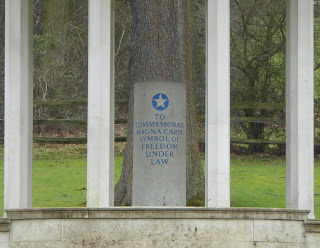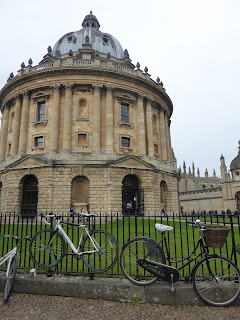Magna Carta Part 3
This week I read "I Am Malala," gaining an insight into the growth of the influence of the Taliban in the Swat Valley in Pakistan, culminating in the shooting of Malala Yousafzai. We are hearing so much about the growth of populism in the West that sometimes one needs to be reminded that the political situation is far more dire in other parts of the world. The populace that could least afford it readily parted with cash and jewellery initially in the mistaken belief that the Taliban would bring about much needed change and so alleviate the difficulties under which they were living. Illiterate and uneducated people, suffering as a result of a lack of action by politicians and disinterest as to their plight, actually thought the Taliban might improve their lot. Malala is, of course, described as the girl who stood up for education and was shot by the Taliban.
After my visit to Runnymede the previous week, it was probably a fitting book to read. King John, forced to sign the Magna Carta by his Barons after squeezing as much gold from them as he could (in part to fight in Crusades against the Muslims of the Middle East), came the closest the UK has ever got to having a written constitution. For the first time in the modern world the concepts of freedom and equality under the law were acknowledged in writing. Runnymede is even referred to as the birthplace of Human Rights' legislation.
Does anything really change though?
The Kennedy Memorial on land gifted to the USA is also at Runnymede. The Memorial Stone sits at the top of 50 steps (one for each of the states) and is inscribed with an extract from the Declaration of Freedom in the inaugural address given by President JF Kennedy.
"This acre of English ground was given to the United States of America by the people of Britain in memory of John F Kennedy President of the United States 1961-63 died by an assassin's hand 22 November 1963 Let every nation know whether it wishes us well or ill that we shall pay any price bear any burden meet any hardship support any friend or oppose any foe in order to assure the survival and success of liberty."
I think that there are certain leaders in the world today who could do with visiting this special place before we all turn in on ourselves and unpick the enormous progress made in the twentieth century towards lasting peace and understanding between nations and nationalities.
You may not agree with what New Labour stood for, but the mantra of "Education, Education, Education," surely has a resonance in these dark days. Certainly Malala and her father were and still are determined to fight for the right of all children, including girls, to be educated. In the words of Save the Children's Every Last Child campaign: "every child deserves a chance to grow up healthy, learning and safe."
As a prequel to reading Malala's book it was probably also fitting that our next stop was Oxford, a city steeped in learning since at least the 12th century. A reminder too though of the connection between the Church and education; historically the power of the Church over those who could neither read nor write; self enlightenment and development through literacy, study and understanding.
Oh my goodness, how I just love retirement. There's so much time to explore, absorb and then, almost best of all, try to collect my thoughts to write a blog entry about it afterwards.






















.jpg)




Comments